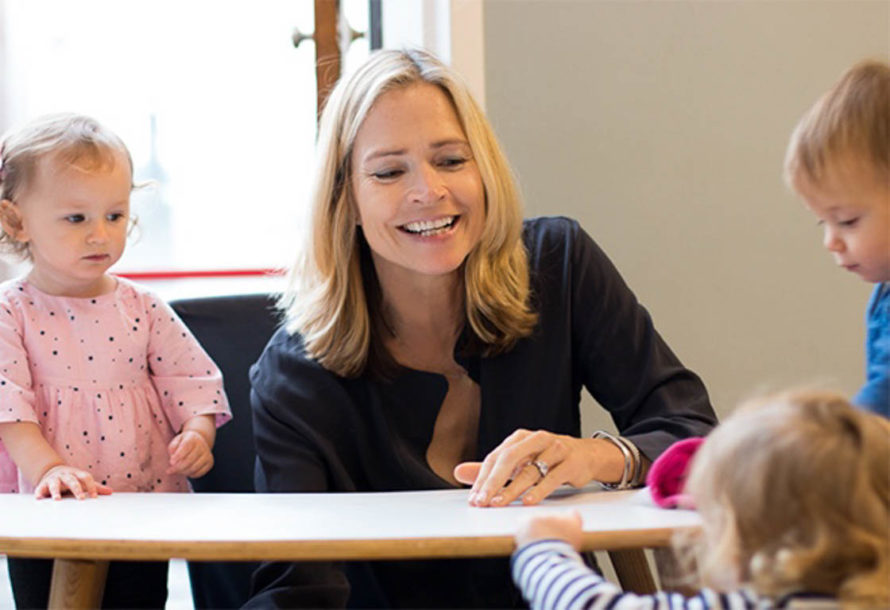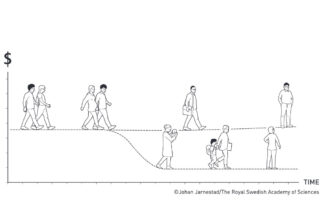What would Janet do?
This article is also available in German.
WWJD? When I encountered this acronym in several parenting Facebook pages, it took me a while to realise that it stands for “What would Janet Do?” Having your own acronym says something about you. Janet Lansbury is a mother to three children aged 25, 21 and 16 and has been a RIE (Resources for Infant Educarers) advocate and practitioner for more than 20 years. The Educaring approach was developed by early childhood educator Magda Gerber who was mentored by Emmi Pikler. Her followers lovingly call Janet’s extensive parenting website the “Janet Lansbury vortex”, her Facebook page is liked by more than 300’000 people, and her podcast “Unruffled” is one of the most downloaded parenting podcasts in the US. I love Janet’s work for its clarity, its abundance of topics, and for the precision with which she responds to her readers questions. Her insights have not only helped me with very specific advice about settling my kids into daycare or giving them medicine, but rather provided me with a framework of the ethics of relationships that has truly changed my mindset about how to interact with the children (and adults) in my life.
I had the pleasure to interview Janet Lansbury about the basic principles of RIE, the questions she hears most often from parents, and what strategies she suggests for parents who struggle with implementing RIE. The links provided refer to articles or podcasts from her website.
Janet, how would you explain Educaring to someone who has never heard of it in three sentences?
RIE perceives infants and children as a separate person on a unique journey, which means that we treat them with the utmost respect. For example, we will tell a baby “I am going to pick you up now”, so that the baby can understand that they are a part of something, and then we will look for signs in which they communicate back. RIE helps you in building this relationship between two people from birth. This article summarizes the RIE principles in more words and shows nine ways to put respect into action.
What are the most typical problems/questions that parents ask you about?
Parents of infants are mainly concerned with crying and sleep. RIE sees crying as a form of communication and encourages parents to look at a baby’s cries with curiosity, rather than fear. The biggest challenge for many parents is to allow children to feel what they feel. My advice is: Let the feelings be! This is very counterintuitive to what most people’s natural reaction is. However, RIE does not advocate for letting babies cry – it is about allowing them to cry, which is completely different.
«The biggest challenge for many parents is to allow children to feel what they feel.»
From birth, I encourage parents to develop patterns for the day, which helps babies develop a sense of security, agency, and confidence. This is really a way to empower babies. Let us give them the same respect as you would an adult, and give them a sense that they are an active participant in their lives. However, even if you did not start with RIE from birth, you can always introduce these concepts at a later stage, it is never too late for respectful parenting!
Parents of toddlers usually ask me questions about discipline. Why are they hitting or talking back? Why do they have unreasonable reactions to minor events and why are they not cooperating? That’s the age when a lot of people realise that they need help with their parenting approach.
For older children, RIE does not make specific suggestions, but the basic approach still applies. It is a way of seeing children, of understanding our role as caregivers, and it helps us to develop a respectful relationship with our children. It is thus valid all the way to the end of our lives. Parents of older children who consult with me usually struggle with behaviour issues, sibling rivalry and problems with social development.
What are common misconceptions and prejudices about respectful parenting that you encounter?
That we are just leaving babies to cry, and that we are abandoning them by allowing them to play on their own. As I said above, this could not be further from the truth. People sometimes don’t understand that RIE is a very holistic and nuanced approach. If a baby is crying, it does not need instant fixing. The most respectful things to do are trying to find out what is going on, and engaging with your child as a person. Especially with children who are pre-verbal, it is really easy to project our own fears and worst case scenarios. So the criticism is mostly rooted in the lack of seeing a baby as an aware and sentient person who can relate to somebody else in a mind-to-mind interaction.
«Especially with children who are pre-verbal it is really easy to project our own fears and worst case scenarios.»
Another misconception is that RIE is very permissive. Actually, RIE is quite a strict approach in terms of boundaries. But the way that we establish them and how we guide our children is loving and respectful. These subtleties take a while to understand.
Speaking of boundaries, I would like to discuss an example of our family life with you that I struggle with: Our son will almost always complain about our dinner plans. He will protest, say that he is not eating any of it and set a negative tone before dinner. After a while at the table, he will then mostly proceed to eat his dinner with pleasure. I long for peaceful dinner times, and the constant complaining bothers me. What would Janet do?
In Magda Gerber’s world it was like that: you put the children to bed, and then you have a nice dinner with your husband, haha! No, you can still eat with your kids, but I see two things: First, this is not about the dinner, the complaining is rather an outlet for his emotions. Second, I think your expectation of a nice dinner with a kid tired from school is the problem.
«This is not about the dinner, the complaining is rather an outlet for his emotions.»
You can see it like a tantrum – it’s not your responsibility, he is using this moment to vent, and the fact that it bothers you gives him fuel to share his complaints. Your boundary is clear: you will not get him different food. Other than that, don’t let this ruffle you! Maybe a peaceful dinner will happen on weekends, when he is less tired. So my advice is simple, although certainly not easy to implement: Rise above it!
«My advice is simple, although certainly not easy to implement: Rise above it!»
As you say, some of RIE methods are not easy to implement. It seems to me that often, there is more work to do within us parents than with our children. What do you recommend parents who struggle with implementing respectful communication and tend to fall back into old patterns of shaming and punishment?
Self-care is a very important element that mothers especially often neglect. And your parenting journey ideally involves a lot of self-reflection. So for example, we look at a situation where we blew up at our child. The first thing most people do is to beat themselves up. But that doesn’t help anybody. If we try to come from a place of loving ourselves first, we will be able to make progress. Ask yourself some questions: What happened there for me? What was I seeing there in my child? Did I feel this is a terrible kid who is out of control? And did I feel like a terrible mother? Did I feel like my kid was being mean to me? We have to understand that first and to acknowledge that we have our own reasons for such a reaction.
Is there more than self-care and reflection?
It’s a life-long process for all of us, because relationships are a life-long process. And for a lot of us, parenting feels so self-defining and important. But no-one is perfect at this. So, the first important step is giving yourself that grace. Often, you are triggered because there was something lacking in your own childhood, because you weren’t fully accepted with the entire range of your emotions. To use imagery, you can thus lovingly take that little girl or boy within you, shower her or him with unconditional love, and put them somewhere safe mentally.
«For a lot of us, parenting feels so self-defining and important. But no-one is perfect at this.»
Then for example listen to podcasts where things are modelled for you, this is often more helpful than just reading about it. As a next step, you practice seeing your child with another lens, for example that they are not going to be at their best after school. Rehearse in your mind how you will handle their behavior and possible emotions. And finally, think about what you can do if you fall back into your old patterns: If you mess up with your child, you repair with him or her, and then you assess. It is really about taking all the fear, failure and shame out of the picture. Be patient with yourself. And know that children are ready to adapt to you behaving differently with them. They will change in a second!
You have been working as a RIE Associate and Practitioner for more than 20 years – what has changed during this time from your perspective?
RIE has become popular – when I started my website, I was happy with 50 visitors on my page per day – now, I get almost 15’000 daily. When I came on the scene, everything was about attachment parenting, RIE was just this other small voice, and I never expected it to become mainstream. I was very surprised that so many parents resonate with this. Some of my posts, like the one about crying mentioned above, or about independent play, were very controversial in the beginning, and now they seem to have much more acceptance. So I see a huge shift in people’s understanding of what children are capable of, and how we can communicate respectfully with them. That makes me really happy!
What is your experience with RIE? How has it influenced your parenting? What difficulties do you encounter?




